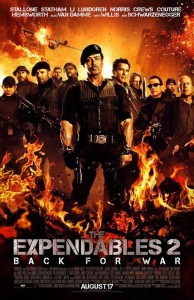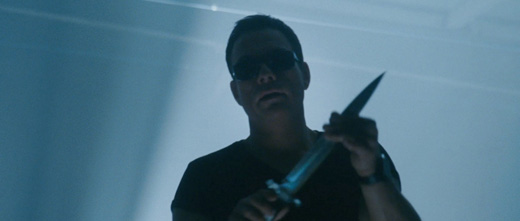
Written by Richard Wenk and Sylvester Stallone
Directed by Simon West
USA, 2012
Of the myriad problems with the horrifically tedious first instalment of The Expendables, one of the most prominent was the incompetent execution of its action sequences. Prone to an absurd cut frequency, confusing spatial relations, terrible CGI blood effects and a hideous form of neon-draped lighting, the sequences provided no thrill and failed to highlight any of its performers’ strengths. Simon West – best known for Con Air – replaces Sylvester Stallone as the man in charge for the sequel, and while the direction is never exemplary or innovative, it is at least competent this time round and the cutting far less frenetic. Jet Li, for one, is in The Expendables 2 very little, but it is nice to actually have his skills complimented by the camera this time. The oppressive electric-blue colour look of the first is also gone, replaced by an (again) competent, mostly grey scheme, while the CGI support has mostly been improved. It seems odd to make a fuss out of simple workman-like approaches and coherence regarding an action film, but the first film was such an oppressive mess of incompetence and banality that any sign of improvement feels like a striking success. The Expendables 2 also seems like a substantial upgrade simply by actually providing some sporadic entertainment.
Like the original, the sequel’s tone repeatedly switches between attempts at serious drama and genre-riffing self-awareness. Both are awkwardly executed and prone to frequent misfires, particularly the former. The dramatic impact of a major player’s demise, for example, is somewhat diminished when it arises from a knife being round-house kicked into a chest. Still, if never potent, the attempts at earnestness here are at least more tolerable than the grim self-seriousness that plagued Stallone’s first. The self-referential humour takes a bigger role as if to overcompensate for that previous grimness. Most of it is flat and much of it – like iconic catchphrase swapping – outright cringe-inducing, but there are a few moments that are genuinely amusing. The film’s increasing absurdities and escalation prove strangely charming, and there are some genuinely nice little visual touches like a former Soviet-run locale made to look like 1950s Americana. There’s additionally something delightfully daft about Chuck Norris’ recurring cameo. The actor just turns up and shoots things, his entrance scored by one of Ennio Morricone’s most famous compositions, barely interacting with any of the principal cast as though they may have only been on set together just the once during filming; they also, as one might except, reference that internet meme involving him.
Part of why the film does have these bursts of entertainment despite its horrible writing and overly-derivative nature is that many of the stars are far more enjoyable presences in the sequel. Terry Crews, for example, is burdened with many of the film’s more nonsensical quips, especially in the opening action sequence, but he’s a versatile, fun performer to watch. Even Dolph Lundgren shows some improvement; the same, sadly, cannot be said for a lumbering Arnold Schwarzenegger who definitely used to be much better at delivering awful puns. The film’s greatest asset, though, is Jean-Claude Van Damme as enemy Jean Vilain. Only introduced nearly halfway into the ninety-odd minute feature, he is an admittedly underused presence but a ridiculously charismatic one who dominates every scene he’s in.
Van Damme has noticeably improved as an actor from his more youthful days, delivering a genuinely good turn with entertaining, blatantly improvised flourishes, and additionally retaining much of the physical prowess of his prime. His fist (and feet) showdown with Stallone in a smoky climactic sequence is shot with refreshingly held takes and minimal cutting, and with no obvious stunt double work. For a film that thrives on call-backs to other works and cinematic legacies, it is nice that the conclusion possesses an encounter that is memorable, free of winking nods, and thrilling entirely in its own right.
Josh Slater-Williams



